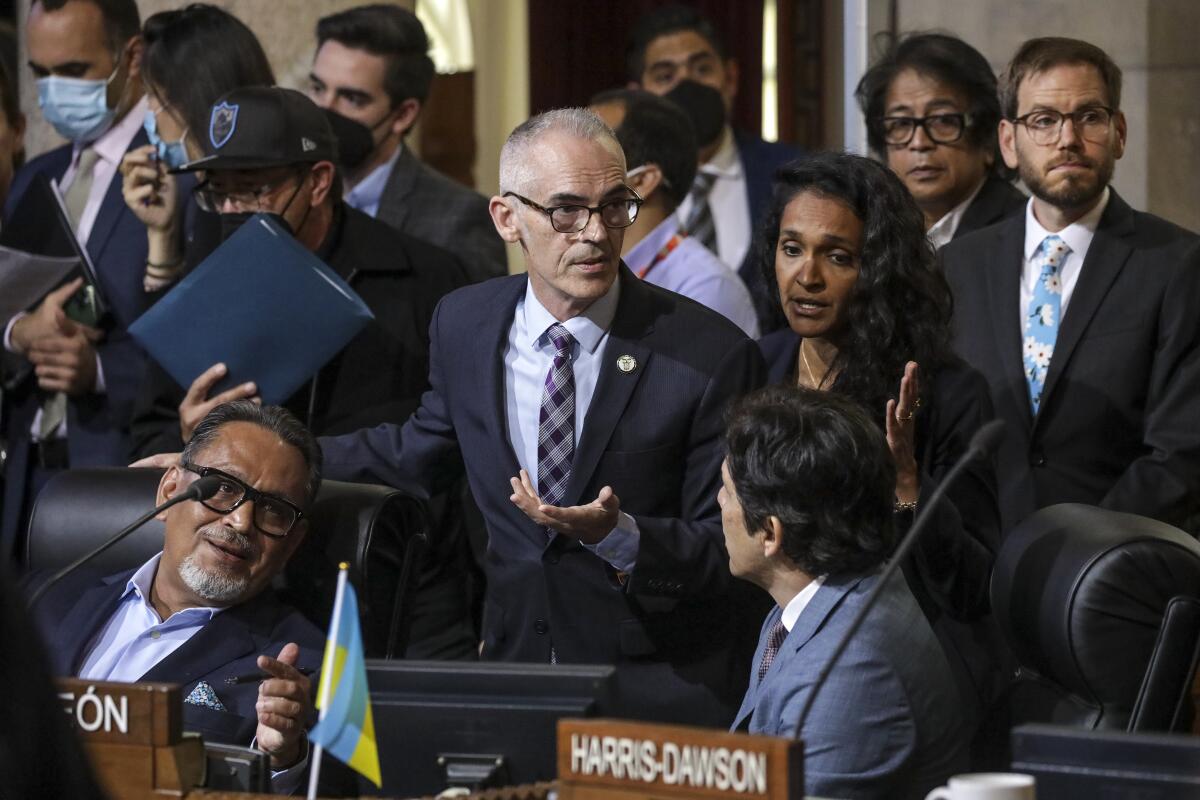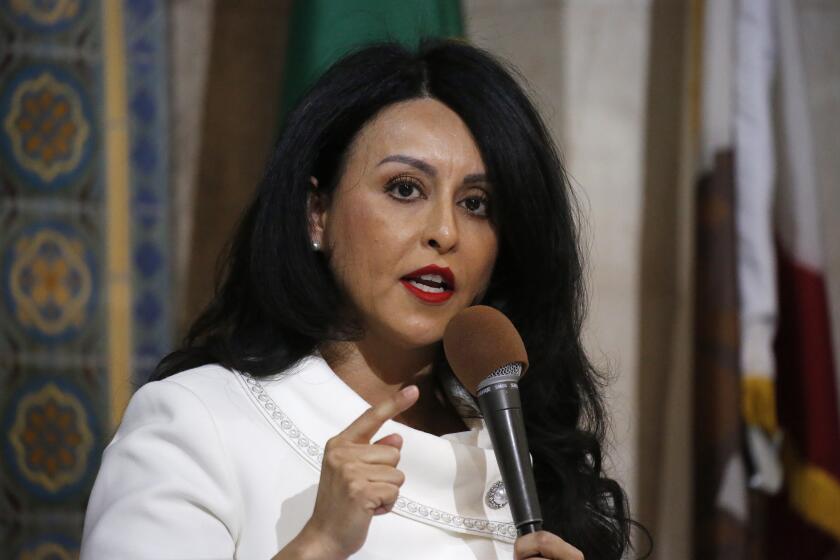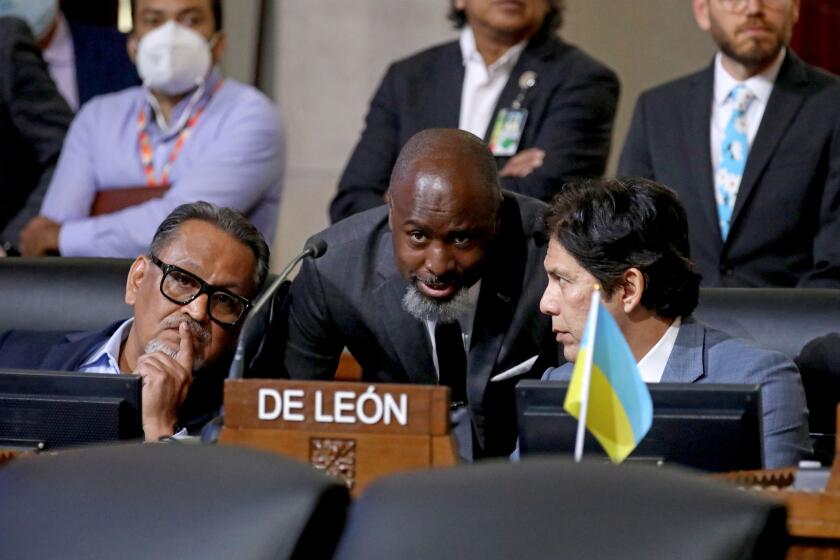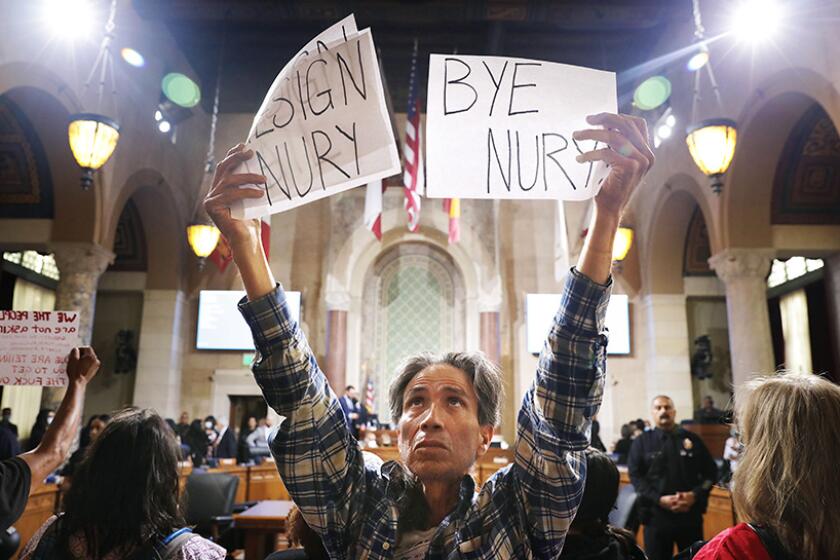Column: Racial coalitions define life in Los Angeles, and City Hall’s divisive politics needs to catch up

We no longer live in the Los Angeles that is depicted in the leaked recordings of city leaders engaging in a casually racist and nakedly corrupt conversation.
Our City Council politics may be tribal and divisive, but all Angelenos lead lives that are in some way multicultural, intentionally or not.
Cambodians, Thais and Filipinos shop in Chinatown. Central Americans and Nicaraguans celebrate special occasions at a Thai restaurant in Koreatown. Quinceañeras and weddings take place at Armenian-owned banquet halls. Black people shop in swap meets, at shops run by Latinos and owned by Koreans. At a stoplight in any given neighborhood in L.A., you can hear someone blasting Nipsey Hussle, Kendrick Lamar or Tyler, the Creator.
But as the leaked recordings show, City Hall isn’t listening.
Angelenos of all races and backgrounds have marched at one another’s protests, shouting “Black Lives Matter!” or “Stop AAPI hate!” or “Protect essential workers!”
But on redistricting priorities, Councilmember Kevin de León said, “Protect me.”
Audio of Councilmembers Nury Martinez, Kevin de León and Gil Cedillo speaking with labor leader Ron Herrera quickly became a new and incendiary issue in the Nov. 8 election.
We eat one another’s food, work together, marry and, over time, learn to share neighborhoods. Sometimes, in our own messy, imperfect way, we come together and recognize a common cause.
But on slicing up Councilmember Nithya Raman’s district through gerrymandering, Councilmember Gil Cedillo said, “She’s not going to help us.... Yeah, why not?”
They — De León, Cedillo and since-resigned Council President Nury Martinez and L.A. County Federation of Labor President Ron Herrera — mocked protestors, journalists and activists but seemed to show empathy for politicians facing scandals and investigations. They bragged cozily about their connections in the U.S. attorney’s office and recast their narrow political setbacks as an insult to Latinos everywhere. And at no point during the meeting did they discuss how another community besides their own might benefit.
Now, some white commentators are using this incident to argue that we should stop talking about race so much. So it’s important to say that what De León, Martinez and Cedillo are doing is not a consequence of racial discourse — it is a manipulation. They’ve distorted the language of racial justice and equity to serve themselves, and in doing so, they’ve harmed every minority group that hopes to have its concerns taken seriously.
To hold politicians accountable, we actually need to talk about race more, and with more sophistication, so that we are not so easily manipulated. Because a politics that divides everyone based on race only makes it easier for corrupt politicians to stay in power.
“In this city, interethnic relations are not a sideshow. They are actually the predominant relationship,” said historian Scott Kurashige.
Real progress in Los Angeles has always required the collective efforts of racial groups, dating back to the coalition of Black, Jewish, Asian and Latino people that brought the city its first and only Black mayor, Tom Bradley, in 1973.
Starting in the 1980s, Asian American and Latino voters in cities across the San Gabriel Valley banded together to break the grip of white political majorities, a collaboration that helped Rep. Judy Chu (D-Monterey Park) win her seat.
In the furor over the racist leaked audio, calls are growing for the city to throw out the boundary lines drawn last year for the council’s 15 districts.
But “it’s been a while since we had those kinds of leaders,” said Megatoys chief executive and longtime political player Charlie Woo.
Woo recalls that when Chinese Councilman Michael Woo’s district was targeted for excessive gerrymandering in the 1990s, Bradley vetoed the map.
“You’re supposed to have a sense of common good in society,” Charlie Woo said. “It’s like our elected officials no longer feel accountable to that.”
He is no stranger to cutthroat Los Angeles politics, but even he was bothered by the racial cynicism on display in the recordings. Honest, grass-roots civic activism on behalf of Asian Americans is hardly ever rewarded in City Hall, Woo said. But even communities that don’t have numbers or political clout deserve to have their needs addressed.
“The Asian American voice is important, but that’s not what they value from me,” Woo said. Politicians “just care about my money, connections and the taxes I pay.”
Kurashige calls this dynamic “the politics of racial succession” — a method of achieving political power first practiced in the United States by Irish, Italian, German and other European immigrants in New York and other Northeastern and Midwestern cities. Minority groups fight for their rights, then, after gaining a critical mass and forming a majority, help maintain the system that originally disenfranchised them. They abandon their coalitions in favor of preserving and maintaining political power.
“The more power you get within the system, the more you have a stake in upholding the status quo,” said Kurashige, author of “The Shifting Grounds of Race: Black and Japanese Americans in the Making of Multiethnic Los Angeles.”
The political future of Los Angeles and the rest of this country will rest on our ability to form coalitions and create a new kind of majority that is built on more solid ground than the politics of racial succession.
For decades, L.A. Black and Latino political leaders formed vital alliances. But these partnership now face unprecedented challenges.
That’s why it’s ironic that the quartet in the recording singled out for criticism Community Coalition South Los Angeles and KIWA Workers for Justice, because these are two of the many groups in the city that are doing that important work. KIWA brings Korean and Latino workers together to demand better conditions, and Community Coalition organizes Black and Latino Angelenos, and others, around a variety of causes.
“It’s a reflection of what Los Angeles should be,” said José Roberto Hernández, KIWA’s chief of staff and director of organizing.
Hernández has counted himself among the admirers of the disgraced councilmembers. He celebrated when Cedillo authored a state law that offered access to driver’s licenses to undocumented immigrants. But now he thinks all three should resign.
The tapes showed “back-door dealing without really any consultation to the stakeholders in the community,” Hernández said. “I have to hold them even more accountable because of these reasons.”
Outside of council politics, Woo says, the city has long since moved beyond the racial zero-sum game. He cites examples of Asian, Latino and Black political engagement groups — like the Center for Asian Americans United for Self Empowerment, Hispanas Organized for Political Equality and the Los Angeles Urban League — collaborating on polling efforts and programming.
“Clearly, elected leaders have not gotten on the same program,” Woo said. “They’re still stuck on, ‘What’s in it for me?’”
In an era when race is more and more relevant to mainstream politics, voters need to demand accountability from those who say they represent us. We should teach one another to identify abuses of representation politics, reject model minority appeals and see beyond surface-level political appeals to food and culture. We should learn to recognize when we are on the same side, even when we don’t have the same culture or language.
Jael Baha is a Oaxacan American who grew up in Koreatown, where her family owns laundromats and dry cleaners. When Martinez’s ugly comments about short, dark people in Koreatown became public, Baha was at a quinceañera. Banda music filled the air, and the women wore their best traditional Oaxacan attire, dancing the Flor de Piña.
Baha takes great pride in her culture, and Martinez’s comments cut deep, especially because Baha volunteers for KIWA.
But she’s glad that the recordings were released.
“Now we know who these people really are,” she said.
More to Read
Sign up for Essential California
The most important California stories and recommendations in your inbox every morning.
You may occasionally receive promotional content from the Los Angeles Times.














